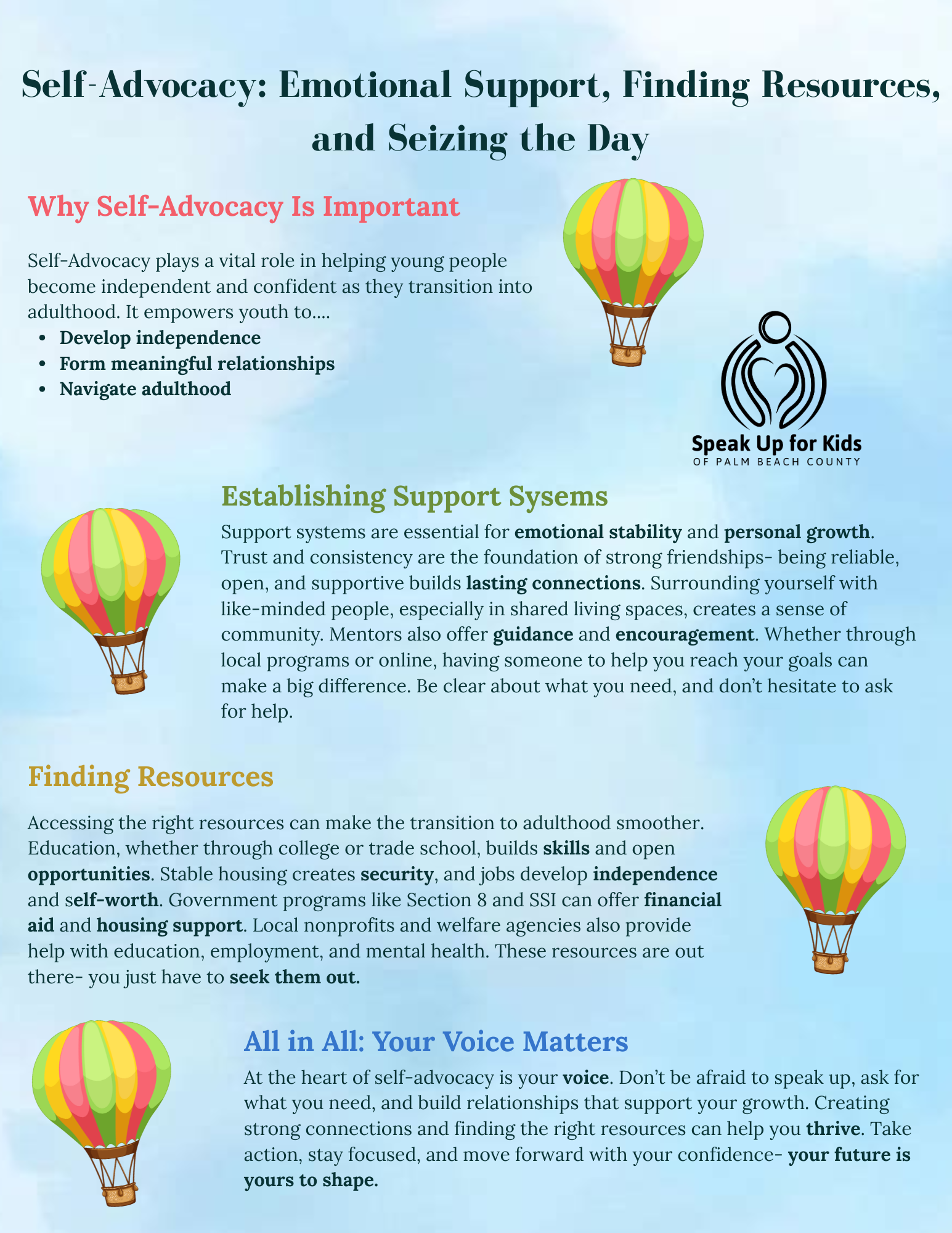Self-Advocacy: Emotional Support, Finding Resources, and Seizing the Day
Contributed by Speak Up for Kids Student Intern Team — This article was developed through the combined efforts of multiple student interns, each bringing unique skills and perspectives to support life skills education for foster youth.
The Importance of Self-Advocacy
Self-advocacy is crucial for learning how to be independent. Self-advocacy can enable aging out youth to develop important skills when it comes to developing relationships, acquire the support they need, and navigate the transition into adulthood.
Establishing Support Systems - Why?
Building strong support systems with family, friends, or peers can enhance your ability to self-advocate. Emotional Support is important because it can help contribute to your development and overall well-being:
The Transition to Adulthood. Forging support systems with trustworthy individuals can offer guidance on how to navigate the difficulties of adulthood.
Mental Health. Having strong relationships with reliable individuals can promote a positive outlook in life and improve self-esteem.
Establishing Support Systems - How
Building effective support systems can be tricky to navigate. Here are some tips on how to get started:
Friends and Peers:
Develop a Sense of Trust. Place an emphasis on openness in relationships, actively listen to people. Understand that people have varying views on life and be there in times of need. Also try to be consistent with people. If someone asks you to do something, do it with purpose. Show others that you can be trusted.
Others Like You. Seek out like-minded individuals when searching for housing accommodations. Whether it’s through a college dorm or an apartment, finding people with shared interests could be beneficial as they may be able to offer you not only a friendship but support when the going gets tough.
Two-Way Street. Building support systems with peers can also be a great way for you to be someone else’s support system. This mutually beneficial relationship between you and others offers an “I’ve got your back” mentality where both individuals can provide encouragement, support, and someone to lean on when life becomes difficult.
Mentors:
Mentorship Programs. There are plenty of local and online opportunities for a kind of mentorship from which you can build out support systems. Whether it’s volunteering, interning, or applying for a new job, check places like libraries, the people you know, or search the internet for opportunities that seem appealing.
Develop Goals. It’s a good idea to familiarize yourself with what you want to get out of a mentorship. Make sure to make your intentions known and don’t be afraid to ask for support, most people are willing to help those who have been diligent in working towards their goals.
Finding Resources - Why?
Resources can seem limited for aging out youth, but it’s important to speak up for yourself and seek out aid in the following areas:
Education. Pursuing higher education, whether college or trade school, allows you to develop the necessary skills for supporting yourself in the future. Education also provides plenty of opportunities for developing the aforementioned support systems as well!
Housing. Resources like independent living programs, rental assistance, and similar resources are ways to find a stable living environment that can provide a sense of security.
Jobs. Getting a job not only helps provide for yourself, but can help you build important life skills, develop professionalism, and increase self-esteem.
Finding Resources - How?
Resources are out there, although it can be challenging to track them down.Here some areas you can begin your search:
Government Resources:
Housing. Transitional housing programs or Section 8 housing vouchers provide an opportunity for stable housing. The U.S. Department of Housing and Urban Development (HUD) can offer HUD Resource Locator, which can assist in finding local housing assistance programs.
Financial Assistance. Programs like Supplemental Security Income can provide aging out youth with financial support for things like food, clothing and housing. Many agencies also offer support in terms of how to best go about acquiring these resources.
Local Resources:
Nonprofit Organizations. There are many non-profit organizations that specialize in helping aging out youth find resources, such as job opportunities or help finding housing.
Welfare Agencies. These agencies can offer information on the resources available to aging out youth, such as financial aid for school, housing assistance, mental health support, or mentorship opportunities.
Wrapping Up
The most important part of self-advocacy is to use your voice. Be intentional about seeking out the resources and relationships you need. There are many others who are in need of aid too, so don’t let your voice be drowned out. To recap, there are two major components of self-advocacy:
Developing emotional support systems can help you establish a sense of trust between you and others, enable you to seek out like-minded individuals, and develop long-lasting mutually beneficial relationships, all of which serve to help you seek out resources.
Finding resources relating to education, housing, and job opportunities can be achieved by investigating government and local agencies that can provide guidance on how to take advantage of available opportunities as well as providing financial assistance for things like housing or education.
Life is a game of momentum, be active, stride bravely towards your goals, and seize the day!


